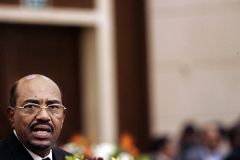Sudan loses bid to lead African Union
Jan 24, 2006 (KHARTOUM) — In a compromise that tested their commitment to human rights, African leaders persuaded Sudan to withdraw its bid to lead the 53-nation African Union and chose the Republic of Congo, whose leader has a less egregious record of abuses.
 Sudanese Foreign Ministry spokesman Jamal Mohamed Ibrahim said his country would assume the rotating one-year presidency in 2007.
Sudanese Foreign Ministry spokesman Jamal Mohamed Ibrahim said his country would assume the rotating one-year presidency in 2007.
“It is a winner. Sudan is not losing,” Ibrahim said afterward.
Delegates said African leaders congratulated themselves on the compromise, reached after 1 1/2 days of often-heated discussion, saying it preserved their unity and the credibility of an organization formed four years ago to promote human rights, development and democracy. It replaced the discredited Organization of African Union, which was seen as a club of tyrants.
Congolese President Denis Sassou-Nguesso was installed as chairman and promised to make a priority “to restore peace, security and stability on the continent.”
Most important was Sudan’s Western Darfur province, he said. The United States has accused Sudan of genocide there in what the United Nations calls the world’s worst ongoing humanitarian crisis. Some 180,000 people have been killed and 2 million forced from their homes in three years.
Despite the presence of 7,000 African Union peacekeepers, the situation has deteriorated and some 800 refugees fled to neighboring Chad just this month, the U.N. High Commissioner for Refugees, Antonio Guterres, told the U.N. Security Council on Tuesday.
“The international community could face a catastrophe in Darfur,” Guterres said. “Averting it will require bold measures … (or) risk a much greater calamity.”
Deep concerns had emerged that Sudan’s human rights record could damage the African Union’s credibility. The organization has carved itself a crucial role in mediating crises including Darfur, where the government of President Omar el-Bashir is accused of using the Janjaweed militia to unleash a campaign of murder, rape, arson and looting to stamp out a rebellion.
The conflict has spilled over into neighboring Chad, which along with Uganda and Eritrea accuses Khartoum of arming and supporting rebels fighting their governments. Sudan denies those charges.
It characterized the controversy over the chairmanship as a fight for influence fueled by the United States. Interior Minister Zubair Bashir Taha on Tuesday “denounced the continued plotting that is being woven against the Sudan.”
Sudan’s Justice Minister Mohamed Ali al Mardhi said both “Americans and the Europeans” put pressure on poorer African countries.
The administration of U.S. President George W. Bush, who on Monday expressed concern at the possibility of Sudan assuming Africa’s leading role, has accused Sudan of genocide in Darfur and kept it on a list of state sponsors of terrorism.
Sassou-Nguesso, asked about his own human rights record, said his country is now at peace, has had democratic elections, and has no political prisoners. A coup leader like el-Bashir, he ruled Congo from 1979 to 1992, then ousted a democratically elected leader in 1997, sparking civil war.
In Brazzaville, the Congolese capital that remains in ruins, many hailed his new role as acknowledgment the country was advancing beyond its violent recent past. Then, human rights groups accused Sassou-Nguesso’s security forces of summary executions, disappearances, rapes and arbitrary arrests.
Political opponents said he was hardly a role model: “It’s a shame to designate President Denis Sassou-Nguesso, who isn’t a brilliant example,” said opposition leader Herve Ambroise Malonga.
Parts of southern Congo remain highly volatile and insecure.
Human rights groups, meanwhile, hailed the decision not to give Sudan the chairmanship this year, but questioned why it would be all right to do so in 2007.
Delegates said the 2007 chairmanship was granted to Sudan without conditions.
But Burkina Faso’s President Blaise Compaore, also a coup leader, indicated some reservations linger.
“We hope that between now and next year we will be able to help him assume his responsibilities in the resolution of crises, which will allow Sudan to take up the chairmanship,” said Compaore, also a coup leader.
The row over Sudan overshadowed the two-day meeting’s planned focus on education and culture, and sidelined the appearance of Africa’s first woman leader, Ellen Johnson-Sirleaf of Liberia, whose recent election closed a chapter on a decade of vicious war.
Hailed by ululating women, she was upbeat about the continent’s future: “Democracy is coming along well, my own election is an attestation to that” she said. “The African Union will survive.”
(AP/ST)
